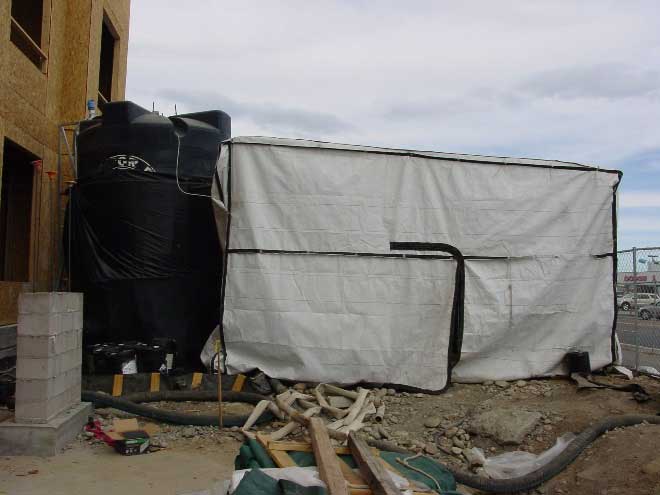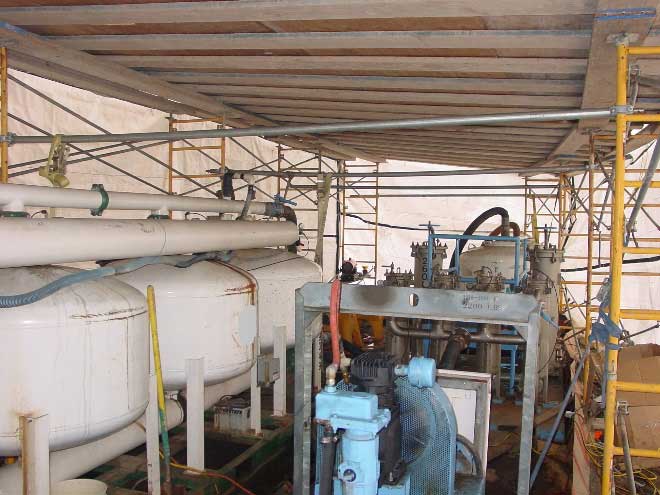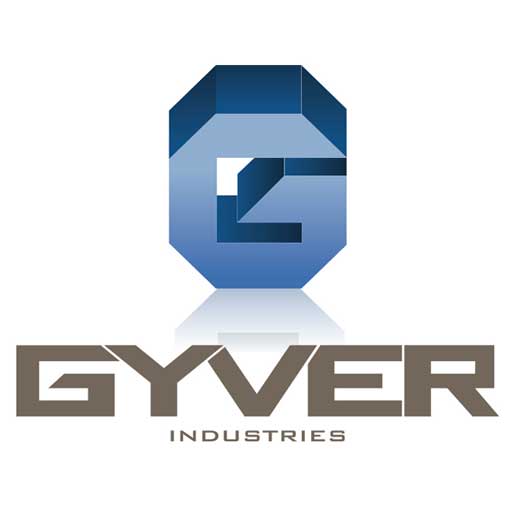Gyver Industries, Inc. (Gyver) would like to take this opportunity to introduce ourselves to you as a resource in Colorado specializing in the treatment, monitoring, and discharge requirements of Industrial Wastewater generated by site dewatering operations during the construction. The dewatering treatment process allows the water to discharge directly and indirectly to surface waters in the state of Colorado.
In the State of Colorado, groundwater that must be pumped, managed, treated, and discharged to the waters of the State are considered Industrial Wastewaters as identified in the: COLORADO DEPARTMENT OF PUBLIC HEALTH AND ENVIRONMENT (CDPHE); WATER AND WASTEWATER FACILITY OPERATORS CERTIFICATION REQUIREMENTS; REGULATION NO. 100; 5 CCR 1003-2, Section 100.6
Colorado regulations require obtaining a discharge permit from CDPHE for the following categories:
- The source water can be considered uncontaminated, you may discharge under the construction dewatering permit (COG070000) for any construction phase dewatering.
- The source water can be considered uncontaminated, you may discharge under the subterranean dewatering permit (COG603000) for any long-term foundation dewatering.
- Where the source water is considered contaminated, the discharge may be covered under the remediation dewatering permit (COG315000).
Permitting Process
The first step to determine the permit requirements is to have the site groundwater sampled and analyzed for specific parameters. Proper sampling containers and procedures need to be used to get accurate information on the groundwater quality for submittal with the permit applications.
Discharges regulated by the above listed permits will generally require oversite by a Colorado Certified Industrial Wastewater operator assigned as the operator in responsible charge (ORC). The certification class of the ORC will be dependent on the processes required to treat the wastewater for discharge.
Gyver engineers are able to perform the necessary sampling to collect proper samples from temporary or permanent groundwater monitoring wells and have them submitted for the required analysis at a certified laboratory to provide accurate information of the groundwater quality for permitting requirements.
Gyver engineers can summarize the analytical data and project information to complete and submit the discharge permit applications to the appropriate regulatory agencies in a timely manner to prevent project delays.
Gyver Industries has the following resources and capabilities to assist with an y Industrial Wastewater issues your site or facility may have:
-
Gyver’s fabrication shop is able to work on small or large projects in; PVC, CPVC, mild steel, stainless steel, or super duplex materials.
-
Gyver’s welders are qualified to weld mild steel, stainless steel, and super duplex materials.
-
Gyver has an AutoCAD department capable of providing complete design services for system or equipment layouts, piping schematics, electrical schematics, and Process & Instrumentation Diagrams (P&IDs).
-
Gyver’s employees have extensive knowledge in various parameter monitoring and data logging equipment.
-
Gyver has designed and built wastewater treatment systems on portable skids for use at various locations.
-
Gyver has designed and built wastewater treatment systems onsite as a permanent installation to meet facility and code requirements.
-
Gyver has designed and written programs for various programmable logic controllers (PLC), programmable automation controllers (PAC), and human machine interface (HMI) systems to automate the control, operation, alarm system, and data logging. Gyver control systems are designed for ease of operation, local operators are trained in the proper use of the system and to be able to generate reports for regulatory compliance submittals.
-
Gyver Industries is certified as a 508A UL electrical panel building shop.
-
The attached statement of qualifications identifies additional types of wastewater projects, treatment methods, and equipment that Gyver is experienced with.
-
Gyver is able to design, procure, install, commision, and provide training for wastewater pretreatment systems that are very simple to extremely complicated to meet the needs of a facilty and their discharge permit requirments.
-
Gyver works with suppliers of rental equipment for temporary systems and suppliers of purchased equipment for permanent systems in a effort to maintain budgetary costs at a reasonable rate.
Gyver Industries’ employees have experience in a vast number of areas. Being a small company, Gyver understands the need to minimize overhead costs for waste management systems. Gyver works with our clients to design a project that is safe, effective, in the most economical manner, meeting an established project budget for construction, and installation. While Gyver is small, we have successfully managed and completed multi-million dollar projects within the United States and internationally
Gyver’s’ process engineer is certified by the State of Colorado as a Class A Industrial Wastewater Operator with 30 years’ experience treating various types of industrial wastewaters to include; plating shop solutions, acid mine drainage, fuel spills, heavy metals contaminated groundwater, and oil field produced waters. Work at Gyver has included the development of processes to treat oil field frack and flowback water. Additionally, this staff member has 25 years’ experience in environmental consulting; working with clients and their municipalities or regulatory agencies concerning all types of permitting, reporting, and aiding facilities to maintain environmental compliance. A copy of the Colorado certification is available up on request.
As the certified operator or ORC of a project, our engineers work closely with the construction company to coordinate everything from the footprint used, to insuring the system is maintained, and not creating scheduling conflicts. Reviews are conducted of the available analytical data, issued permits, and the treatment system design. Gyver will perform regular site visits, works closely with assigned operators to insure they are properly trained and familiar with the equipment being used, prepare the discharge monitoring reports for submittal to the regulatory agencies, per form or oversee compliance sampling for submittal to the analytical laboratory, and is available on call on a 24/7 basis during operations.
Temporary Dewatering System for a Construction Site


The above pictures are of a winterized temporary construction dewatering and treatment system operated previously in Boulder, Colorado, to remove iron and manganese. The system consisted of: flow equalization; chemical and aeration treatment; filtration through green sand filters, bag filters, cartridge filters, and granular activated carbon; a sludge management system; and flow monitoring prior to discharge into the local storm sewer which emptied into Boulder Creek. The treatment system required a limited footprint to allow the building construction on one side and the realignment of the street and sidewalk on the other side. This facility was managed under a State of Colorado issued discharge permit. The facility ultimately required a permanent dewater system due to the groundwater table elevation and the parking garage floor elevation.
If your future construction site requires dewatering or your facility is considering upgrading or is replacing its industrial wastewater pretreatment system Gyver would welcome the opportunity to discuss your needs with you and provide a quote. If you have any questions or would like additional information please contact Gyver Industries at (970) 568-4220.
The above pictures are of a winterized temporary construction dewatering and treatment system operated previously in Boulder, Colorado, to remove iron and manganese. The system consisted of: flow equalization; chemical and aeration treatment; filtration through green sand filters, bag filters, cartridge filters, and granular activated carbon; a sludge management system; and flow monitoring prior to discharge into the local storm sewer which emptied into Boulder Creek. The treatment system required a limited footprint to allow the building construction on one side and the realignment of the street and sidewalk on the other side. This facility was managed under a State of Colorado issued discharge permit. The facility ultimately required a permanent dewater system due to the groundwater table elevation and the parking garage floor elevation.
If your future construction site requires dewatering or your facility is considering upgrading or is replacing its industrial wastewater pretreatment system Gyver would welcome the opportunity to discuss your needs with you and provide a quote. If you have any questions or would like additional information please contact Gyver Industries at (970) 568-4220.

